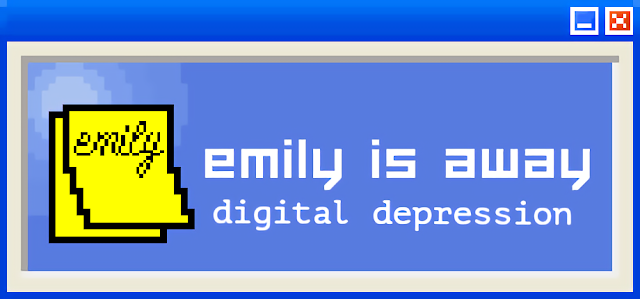Emily Is Away: Digital Depression
Emily Is Away is a (very short) piece of interactive fiction created by one Kyle Seeley, much in the same vein as Digital: A Love Story by Christine Love. Digital: A Love Story was a trailblazer in the genre of interactive fiction, creating an simulated environment that hearkened back to the glory days of the pre-internet digital landscape of the 1980s. Emily Is Away wears its influences on its sleeve and is similarly a simulated environment, not of BBS's and dialup startups, but of the early-2000s internet with a Windows XP interface. Using AOL Messenger as the primary tool of delivering its narrative, Seeley spins a tale of longing, desperation, mental illness, and heartbreak between two best friends.
The story is thus: you and your friend Emily have a series of conversations that span the breadth of 2002 through 2006, from senior year of high school to senior year of college. These conversations range from innocuous musings of times gone by, venting about breakups, conflict caused by miscommunication and bad decision making, and - finally - going on your own separate ways. The story itself is nothing new but there's something very telling about the fact that the primary way of communicating the various shifts in your and Emily's lives is through AOL Messenger.
There is always distance between you and Emily and, even in the times when it's clear that you and her have interacted in person, everything is still seen through this interface, after the fact and removed from the substantive moments of both of your lives. You begin to show an interest in a girl named Emma, while Emily is having tough times with her boyfriend Brad - with there even being some implication that he is abusing her. None of this is ever shown explicitly, but the player is left to infer that certain things have happened or not happened since the year-long gap between the chapters of the story. As such, the "distance" that this story maintains allows these conversations to take on a flavor that makes them feel more universal in their portrayal of an ever-straining friendship.
Perhaps the most significant moment of this distance is when you have the opportunity to invite Emily over to your college dorm. Should you do so - even if you have no intention of sleeping with her - that is what you end up doing. Emily confronts you about it, seemingly a few months later, and asks whether the entire affair was intentional, whether you really were planning on having sex with her - and thus got yourselves blackout drunk in the process. You don't have to pick the option, but it's clear from the dialogue choices presented to the player that Emily was the one who initiated the hookup, which makes her fury at you much more complicated. Indeed, it feels much more like Emily is throwing away any responsibility that she might have in what had happened in your face, instead of assuming said responsibility for the actions that she has come to regret. It's a much more telling moment, given what is not ever explicitly said.
As well, the entire game isn't just these conversations. The player has the option of looking at Emily's profile and reading her biography (alongside several other people's biographies). Emily's begin jokingly and innocent, before slowly becoming more and more sorrowful and melancholic as the years trudge on. Indeed, it's clear from the way that Emily's acting that she's afflicted with some sort of mental illness, most likely a kind of depression. Her inability to trust people, the trouble in her relationships, the apparent abuse she suffers from her ex-boyfriend (and her insistence on not letting him go), the terrible things that her friends put her through - it's all an aspect of her depression. And so when her best friend invites her over to his dorm and you end up having sex, it's hard not to feel like even you have used her. She can't handle it, and so cuts ties with you instead of attempting to reconcile.
Of course, this distance works both ways. You allegedly begin to have a thing for a girl named Emma, and it's certainly no coincidence that her name is the same as Emily's. She's nothing short of a replacement goldfish and there are even hints that you might just be using Emma just as a way of making Emily jealous or to see what she thinks about your pursuit of romance. In the end, this relentless pursuit of Emily - even through the supposed "plot" to make her sleep with you - ends up screwing you both emotionally and mentally. You seemingly don't realize that Emily has any sort of mental hangups, even though it's clear that Emily is going to you for help post-breakup with Brad. As such, you end up taking advantage of her fragile, vulnerable state. You never get over this, as it's clear that you've completely let Emma go, instead having started a relationship with Mike, your friend.
In the final conversation between you and Emma, you attempt to ask her if you can be something more, but every time you do so, you chicken out and begin deleting what you really want to ask, instead asking inane questions that have little relevance to the current situation. Indeed, you are ultimately left with no choice but to say "goodbye," seemingly for good. You have a last conversation with Emily and, instead of Emily leaving first as every dialogue had ended before, you leave. You leave, having lost everything that you had been pining for for five years. The fact that these chapters, incidentally, happen a year apart - with seemingly little else having happened during that time is yet another aspect of this "distance." Time's moving too fast and you have been swept up and dragged along by the current instead of trying to fight back. In the end, the water of time overtakes you and you're left drowning in your own misdeeds.
Emily Is Away is succinct in its delivery of a poignant, self-assured narrative that has depth of character, relatability in spades, and a loving homage to the melancholy days of the early 2000s.
emeryl35 is away



Comments
Post a Comment